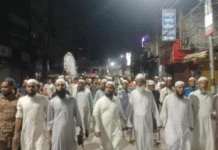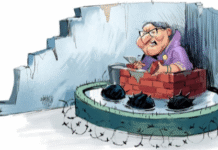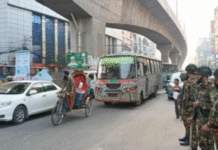
This is an enemy that defies borders and boundaries
“I am more worried about dying of hunger than corona.”
This statement made by a rickshaw-puller in Bangladesh really gives us a sense of perspective on the current situation with Covid-19. While people in some countries are stockpiling, panic buying, and fighting over toilet paper, others are fighting to stay alive.
Social distancing, self-isolation, quarantine, lockdowns, and curfews have different implications and consequences for different people.
For some, staying at home for an indefinite period of time may just be a cause of inconvenience and boredom, for the elderly and vulnerable, being separated from family and friends can be a stressful experience, and to others who live hand to mouth on a day to day basis it is the inability to feed themselves or their families for the foreseeable future.
When you have no food to eat, washing hands with soap multiple times is a moot point.
What is evident is that the pandemic is not just overloading health care systems worldwide but the necessary policy response is paralyzing the global economy. What is also glaringly obvious is that we are just not equipped to deal with Covid-19 or any pandemic for that matter. Nurses, doctors, and health carers are overstretched with hospitals lacking adequate facilities and beds, and there are not enough tests available to the public.
As I write, there have been more than 500,000 coronavirus cases identified and over 23,000 deaths. While 123,000 people have recovered so far, two months into the crisis, a vaccine is yet to be developed.
Up until now, notwithstanding the best efforts of health care workers, whether you survive or are at risk of dying has been a question of whether you happen to be one of the lucky ones or not.
You could call it Covid-19’s version of Russian roulette.
Since the outbreak, despite the lessons learned from China and Italy, governments across the world have been dragging their feet and then scrambling to address the crisis with various levels of success, more or less working on a trial and error basis. There seems to be no protocol, clear guidelines, or any agreed coordinated international plan of action in place for this kind of global emergency.
Last week in the UK, we saw interviews of people in pubs, photos on social media of people in parks, and more recently, images of thousands of people on a beach in England enjoying the sunshine, showing a lack of understanding as to the gravity of the situation. The initial absence of direction and clear guidance by the current government has possibly contributed to the unwillingness of the public to accept the information on the spread of Covid-19 and how to limit its reach.
It has unquestionably been a source of frustration for many including health carers, those working on the front line and people most at risk. On March 24, British Prime Minister Boris Johnson addressed the nation to announce new rules with immediate effect to get people to stay at home.
This has been complied in varying degrees. Today I came across a video of a policeman telling people it was a lockdown and not the time for sunbathing in the park.
Very recently, Bangladesh and India have imposed a total lockdown banning all water, rail, and domestic air travel to combat the spread of the virus. A curfew or lockdown may be the only way to stop people from going out, but it may not address the issue of multiple family members living in confined spaces or overcrowded neighbourhoods and communities in densely populated cities.
In refugee camps such as the Rohingya camp in Bangladesh, where self-isolation or social distancing are not a viable option, the consequences of an outbreak are unimaginable.
In 2018, according to the Stockholm International Peace Institute, the global military expenditure and weapons trade was a staggering $1.8 trillion with the US, China, Saudi Arabia, India, and France taking the top spots.
Yet not one dime, yuan, or euro cent of this obscene amount of money has been effective in fighting the war on Covid-19. While we have been building an arsenal of weapons to inflict unspeakable suffering and destruction on each other, we have allowed ourselves to be taken by surprise by a virus.
This is an enemy that defies borders and boundaries; does not care about race, religion, or ethnicity; does not discriminate between the rich, the powerful, or the poor, and has no allegiances. The challenges of containing and stopping Covid-19 are unprecedented. The way forward is to share information, knowledge, and resources.
We as a race are not known for learning quickly from our mistakes, but now would be a good time to start. Covid-19 has been the mother of all wake-up calls.
Nadia Kabir Barb is a writer, journalist, and author of the short story collection Truth or Dare.









